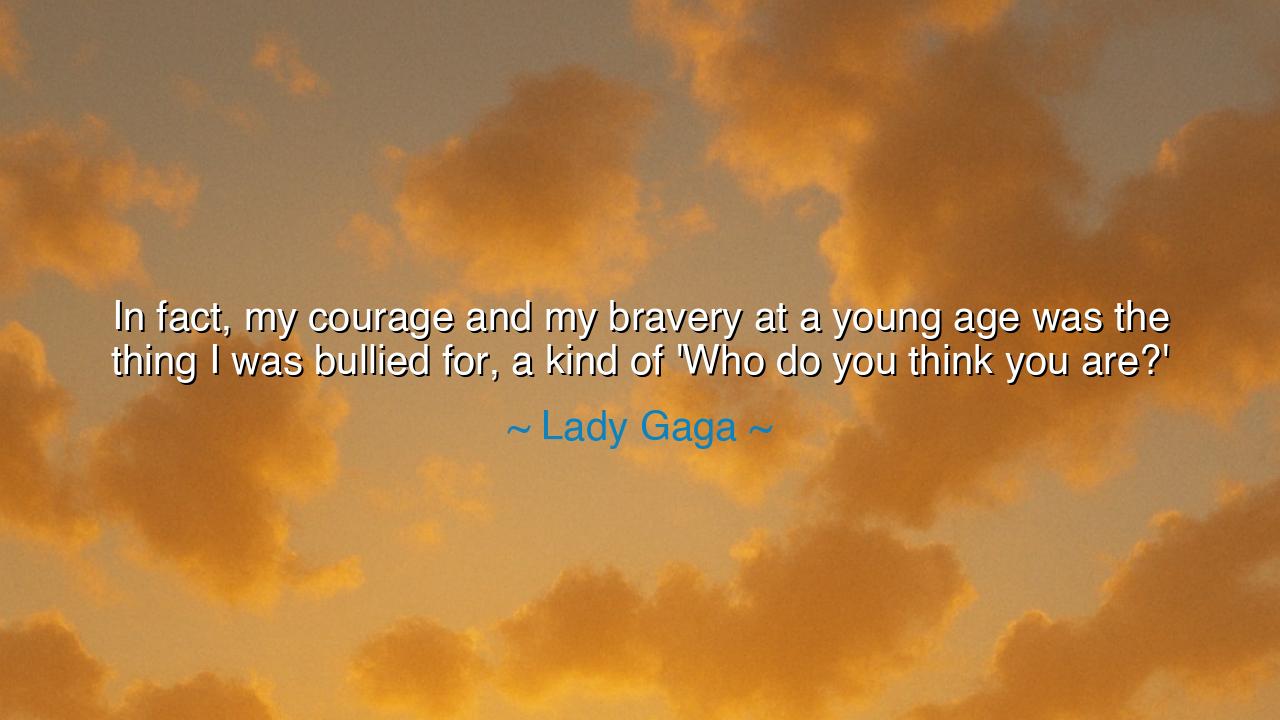
In fact, my courage and my bravery at a young age was the thing I
In fact, my courage and my bravery at a young age was the thing I was bullied for, a kind of 'Who do you think you are?'






In her haunting and powerful confession, Lady Gaga — a voice of both rebellion and compassion — declares: “In fact, my courage and my bravery at a young age was the thing I was bullied for, a kind of ‘Who do you think you are?’” These words reveal a truth as old as time itself: that the world, in its insecurity, often punishes those who dare to stand out. Her reflection is not merely about childhood cruelty, but about the universal struggle of every soul who dares to be authentic in a world that fears authenticity. She speaks as one who has walked through the fire of rejection and emerged with her identity forged in flame — a reminder that the very qualities that make us strong may first make us targets.
The origin of this quote comes from Lady Gaga’s personal recollections of her youth, when she, born Stefani Germanotta, was mocked for her individuality — her boldness, her creative spirit, her refusal to fit neatly within the expectations of others. The taunt, “Who do you think you are?”, was not a question but a weapon, a way of enforcing conformity. Yet beneath its sting lies a deep spiritual truth: society fears the mirror held up by the brave. Those who show courage, creativity, or conviction remind others of what they have suppressed in themselves. The bully’s laughter, then, is the sound of fear disguised as scorn — fear of freedom, fear of difference, fear of self.
Throughout history, courageous souls have suffered the same fate. Consider Joan of Arc, a peasant girl who dared to believe that her voice mattered in a world ruled by kings and clerics. She was mocked, doubted, and condemned as mad — yet her courage moved armies and changed nations. The cry of her enemies, though cloaked in theology, was the same: “Who do you think you are?” For the world has always turned upon those who embody light, for their brilliance exposes the shadows that others seek to hide. But Joan, like Gaga, understood that courage is not arrogance, and authenticity is not rebellion — they are the soul’s way of answering the call of truth.
Lady Gaga’s reflection also exposes the paradox of bravery: it often isolates before it liberates. The child who dares to sing when others whisper, to dream when others doubt, becomes the outcast — for her freedom reveals their fear. Yet, as the years pass, it is often the outcast who becomes the example, the wounded who become the healer, the silenced who become the voice. Gaga herself transformed her pain into art, her rejection into revolution. The very courage she was mocked for became the foundation of her greatness. This is the eternal cycle of the bold: first mocked, then feared, and at last, admired — for truth always rises, though it may first be buried beneath the stones of ridicule.
The message within her words is one of fierce self-acceptance. The world will always ask, “Who do you think you are?” — not because it does not know, but because it fears that you might answer. The challenge, then, is to reply not with anger, but with certainty. To know oneself — one’s gifts, one’s passions, one’s sacred purpose — is the beginning of freedom. Courage is not the absence of fear; it is the will to act rightly in the face of it. And when that courage is misunderstood, it must not be abandoned. The one who hides their light to please the crowd only deepens the world’s darkness.
We may also find this truth in the story of Galileo Galilei, who looked into the heavens and proclaimed that the Earth was not the center of the universe. His courage to see and to say what others feared earned him condemnation and imprisonment. The question the world hurled at him was the same: “Who do you think you are, to challenge the established order?” Yet Galileo’s courage, like Lady Gaga’s, revealed a principle unshaken by persecution: truth cannot be silenced, and neither can the spirit that seeks it.
Thus, my child, take this teaching into your heart: when you are mocked for your courage, know that you are walking the same path as all who have ever dared to be real. Do not shrink from your brightness to comfort the dim. Do not apologize for your voice because others whisper. The question “Who do you think you are?” is not an insult — it is an invitation. It asks you to define yourself, to proclaim your essence without shame. And when you answer — not with pride, but with clarity — the world begins to change, for your courage gives permission to others to find their own.
So remember, the courage that offends the timid is the same courage that inspires the lost. Be brave enough to be misunderstood. Be steadfast enough to remain kind. The road of authenticity is never easy, but it is sacred. Let the world ask who you think you are — and answer not with words, but with the radiant truth of a life fully lived. For that is the greatest revenge against cruelty, and the purest triumph of the human spirit.






AAdministratorAdministrator
Welcome, honored guests. Please leave a comment, we will respond soon